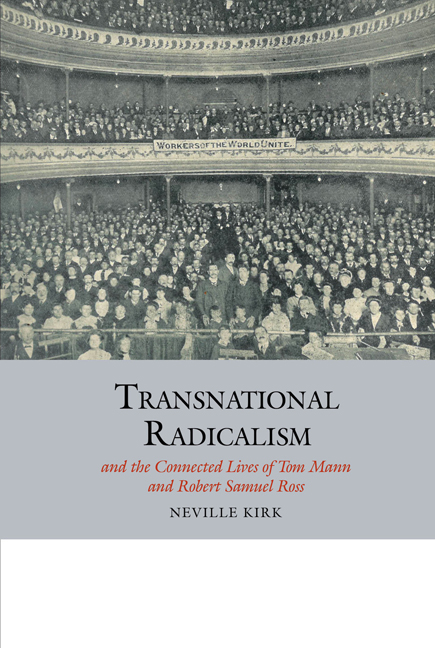2 - The Transnational World of Mann and Ross
from 1 - The Transnational Context
Summary
Introduction
Mann and Ross inhabited a world characterised by many transnational comings and goings and, up to the time of World War I, by free-trade globalisation. The purposes of this chapter are to reconstruct both the relevant broad features of this world and Mann's and Ross's relationships with and influences upon other radicals who were also seeking to reform or transform the expanding capitalist system.
The Transnational World
Globalisation
Between the 1880s and 1914, industrial capitalism became increasingly global in its ambition and reach. As maintained by Ellen Meiksins Wood, globalisation, as a feature of capitalism, is not new but rather inherent in ‘the logic of capitalism as it has been from the start’. That ‘logic’ involves competition between nation states and their empires around the search for new markets and sources of cheap labour in order to ‘satisfy the basic imperative of profit maximisation’. Yet globalisation does not develop anthropomorphically and inexorably over historical time, place and space. In truth, the factors promoting globalisation by compressing time and space, promoting ‘the interconnectedness of different parts of the world’ and accelerating ‘the “interdependence” of societies and states’, are subject to the influence and control of human beings. They also vary in intensity and effect over time and are influenced by historical contingency and context. Globalisation has a human history as well as a present.
As noted earlier in this study, globalisation in the half-century before World War I was characterised by free mass migrations of people, ideas and cultures across the globe, technological revolutions in transport and communication (especially the steamship and telegraph), the spread of industrialisation and urbanisation and the mushrooming rivalries and conflicts of the ‘new imperialism’. It was during this period that the capitalist mode of production, based at its core upon private ownership and commodification, extended, albeit unevenly, its influence across much of the globe. At the same time the imperialist powers of Britain, the major European countries, the USA and Japan ‘intensified their rivalry and sought to “carve up” and subject to their formal rule or informal political control Africa, Asia and much of the rest of the world’. During the interwar period and that of World War II, however, free-trade globalisation gave way to the economic protectionism of national and regional economic blocs, in some cases extreme nationalism and xenophobia and racially based controls, exclusions and killing.
- Type
- Chapter
- Information
- Publisher: Liverpool University PressPrint publication year: 2017



